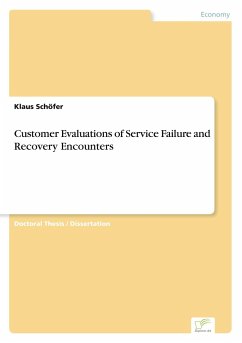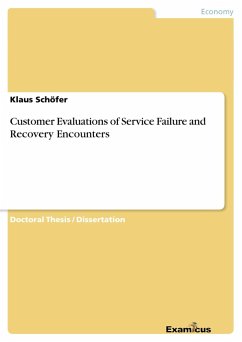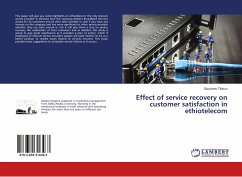
Customer Evaluations of Service Failure and Recovery Encounters
Versandkostenfrei!
Versandfertig in 1-2 Wochen
48,00 €
inkl. MwSt.

PAYBACK Punkte
0 °P sammeln!
Inhaltsangabe:Abstract: Although many firms may aspire to offer ?zero defects? service, the possibility of service failures cannot be wholly eliminated simply because of the variety of factors that may impact on the delivery process. Consequently, the manner in which firms respond to service failures is increasingly seen as a factor that may separate the more successful firms form the others. This response, termed service recovery, is defined as the process by which the firm attempts to rectify a service failure. Some researchers suggest that a firm?s response to failures can either reinforce ...
Inhaltsangabe:Abstract: Although many firms may aspire to offer ?zero defects? service, the possibility of service failures cannot be wholly eliminated simply because of the variety of factors that may impact on the delivery process. Consequently, the manner in which firms respond to service failures is increasingly seen as a factor that may separate the more successful firms form the others. This response, termed service recovery, is defined as the process by which the firm attempts to rectify a service failure. Some researchers suggest that a firm?s response to failures can either reinforce customer relationships or exacerbate the negative effects of the failure. In fact, some assert that it is often a firm?s response to a failure, rather than the failure itself, that triggers discontent. Recoveries are critical because customers perceiving poor recovery efforts may dissolve the buyer-seller relationship and purchase elsewhere. Such customer turnover can be costly, especially given that it costs more to win new customers than it does to retain current ones. As a consequence, service failure and recovery encounters have been recognised as critical moments of truth for organisations in their efforts to satisfy and keep customers. Although there is a substantial literature on customer (dis)satisfaction and complaining behaviour, relatively little progress has been made in developing a theoretical understanding of how consumer evaluate a company?s response to service failure and recovery encounters. Using perceived justice theory as a conceptual foundation, the current research develops and tests a model that (1) explains how customers evaluate service failure and recovery encounters and (2) how these evaluations affect customer satisfaction and subsequent post-purchase behaviour and attitudes. The study employed a two-stage research strategy. The first phase of the research included an extensive literature review and exploratory research involving semi-structured interviews and experiments. This first stage resulted in the development of a research model establishing the links between the antecedents and outcomes of customer satisfaction judgments involving service failure and recovery encounters. In the second phase, the proposed conceptual model was evaluated through a self-administered, cross-sectional survey. Respondents were requested to recall a time when they complained to a travel and tourism services provider about a failed [¿]














